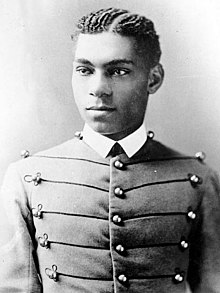Henry Ossian Flipper | |
|---|---|
 Cadet Henry O. Flipper USMA Class of 1877 | |
| Born | March 21, 1856 Thomasville, Georgia, U.S. |
| Died | April 26, 1940 (aged 84) Atlanta, Georgia, U.S. |
| Allegiance | |
| Service | |
| Years of service | 1877–1882 |
| Rank | |
| Unit | 10th Cavalry Regiment |
| Battles / wars | Indian Wars |
| Other work | Civil engineer |
Henry Ossian Flipper (March 21, 1856 – April 26, 1940) was an American soldier, engineer, former slave and in 1877, the first African American to graduate from the United States Military Academy at West Point, earning a commission as a second lieutenant in the United States Army. He was also an author who wrote about scientific topics and his life experiences.
After his commissioning, he was assigned to one of the all-black regiments in the U.S. Army, which were historically led by white officers. Assigned to 'A' Troop under the command of Captain Nicholas M. Nolan, he became the first nonwhite officer to lead buffalo soldiers of the 10th Cavalry. Flipper served with competency and distinction during the Apache Wars and the Victorio Campaign, but was haunted by rumors alleging improprieties. Eventually, he was court-martialed and dismissed from the U.S. Army.
After losing his commission in the Army, Flipper worked throughout Mexico and Latin America as an assistant to the Secretary of the Interior. He retired to Atlanta in 1931 and died of natural causes in 1940.
In 1976, his descendants applied to the U.S. military for a review of Flipper's court-martial and dismissal. A review found the conviction and punishment were "unduly harsh and unjust" and ordered Flipper's dismissal be changed to a good conduct discharge. Shortly afterwards, an application for pardon was filed with the Secretary of the Army, which was forwarded to the Department of Justice. Eventually, President Bill Clinton posthumously pardoned Lieutenant Henry O. Flipper on February 19, 1999, 118 years after his conviction.